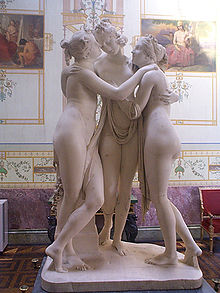Pasithea

In Greek mythology, Pasithea (Ancient Greek: Πασιθέα), or Pasithee, was one of the Graces. She is obscure, and the primary sources of information about her are limited to Homer and Nonnus. In book 14 the Iliad, Pasithea is one of the younger Graces. Hera promises her in marriage to Hypnos, the god of sleep, in exchange for his ensuring that Zeus is temporarily removed from the action of the Trojan War.[1][2] Nonnus reuses Homer's deception of Zeus episode as part of a different story.
Name
The meaning of the name is obscure. If it is a compound, then "Pasi-" may be the dative πᾶσι, "all," but then the second element "-thea" would be of unknown significance. Hederichs (1770) speculates that it may be from the verb θέω, run, which would make the name something like "running in all directions."[3]
Role
If she was a Grace assigned a particular role or function, there is no mention of that in Homer or Nonnus. In both stories she remains off stage, and her main attribute seems to be her sexual desirability to Hypnos. Although many sources refer to three Graces, Homer does not imply any specific number. Robert Graves thinks that Homer also mentions the names of two Charites, Pasithea and Cale ("Beauty"), but the two Charites Homer used for Hesiod's Aglaea.
Parentage
The Charites are usually said to be the daughters of Zeus and Eurynome, but Pasithea's parentage is given by Nonnus as Hera[4] and Dionysus.[5]
Notes
- ^ Cartwright, Mark. "The Graces". World History Encyclopedia. Retrieved 2022-10-12.
- ^ Homer, Iliad 14.268 & 276; Pausanias, 9.35.4.
- ^ "Benjamin Hederichs ... Gründliches mythologisches lexicon, worinnen so wohl die fabelhafte, als wahrscheinliche und eigentliche geschichte der alten römischen, griechischen und ägyptischen götter und göttinnen und was dahin gehöret, nebst ihren eigentlichen bildungen bey den alten, physikalischen und moralischen deutungen zusammen getragen, und mit einem anhange dazu dienlicher genealogischer tabellen versehen worden". Leipzig, In Gleditschenshandlung. 1770.
- ^ Nonnus, Dionysiaca 31.103 ff.
- ^ Nonnus, Dionysiaca 15.87 ff. & 33.4 ff.
References

- Hesiod, Theogony from The Homeric Hymns and Homerica with an English Translation by Hugh G. Evelyn-White, Cambridge, MA., Harvard University Press; London, William Heinemann Ltd. 1914. Online version at the Perseus Digital Library. Greek text available from the same website.
- Homer, The Iliad with an English Translation by A.T. Murray, Ph.D. in two volumes. Cambridge, MA., Harvard University Press; London, William Heinemann, Ltd. 1924. ISBN 978-0674995796. Online version at the Perseus Digital Library.
- Homer, Homeri Opera in five volumes. Oxford, Oxford University Press. 1920. ISBN 978-0198145318. Greek text available at the Perseus Digital Library.
- Nonnus of Panopolis, Dionysiaca translated by William Henry Denham Rouse (1863-1950), from the Loeb Classical Library, Cambridge, MA, Harvard University Press, 1940. Online version at the Topos Text Project.
- Nonnus of Panopolis, Dionysiaca. 3 Vols. W.H.D. Rouse. Cambridge, MA., Harvard University Press; London, William Heinemann, Ltd. 1940–1942. Greek text available at the Perseus Digital Library.
- Pausanias, Description of Greece with an English Translation by W.H.S. Jones, Litt.D., and H.A. Ormerod, M.A., in 4 Volumes. Cambridge, MA, Harvard University Press; London, William Heinemann Ltd. 1918. ISBN 0-674-99328-4. Online version at the Perseus Digital Library
- Pausanias, Graeciae Descriptio. 3 vols. Leipzig, Teubner. 1903. Greek text available at the Perseus Digital Library.
- Smith, William; Dictionary of Greek and Roman Biography and Mythology, London (1873). "Charis"
- v
- t
- e
deities
| Titans (male) | |
|---|---|
| Titanides (female) | |
| Children of Hyperion | |
| Children of Coeus |
|
| Children of Crius |
|
| Children of Iapetus |
|
deities
| Twelve Olympians | |
|---|---|
| Olympian Gods |
|
| Muses | |
| Charites (Graces) |
|
| Horae (Hours) |
|
| Children of Styx |
|
deities
| Sea deities |
|
|---|---|
| Oceanids | |
| Nereids |
|
| Potamoi | |
| Naiads |
deities
| Theoi Chthonioi | |
|---|---|
| Erinyes (Furies) | |
| Earthborn | |
| Apotheothenai |
| Children of Eris | |
|---|---|
| Children of Nyx | |
| Children of Phorcys | |
| Children of Thaumas | |
| Children of other gods | |
| Others |
|
| Sky |
|
|---|---|
| Agriculture | |
| Health | |
| Rustic deities |
|
| Others |
|










